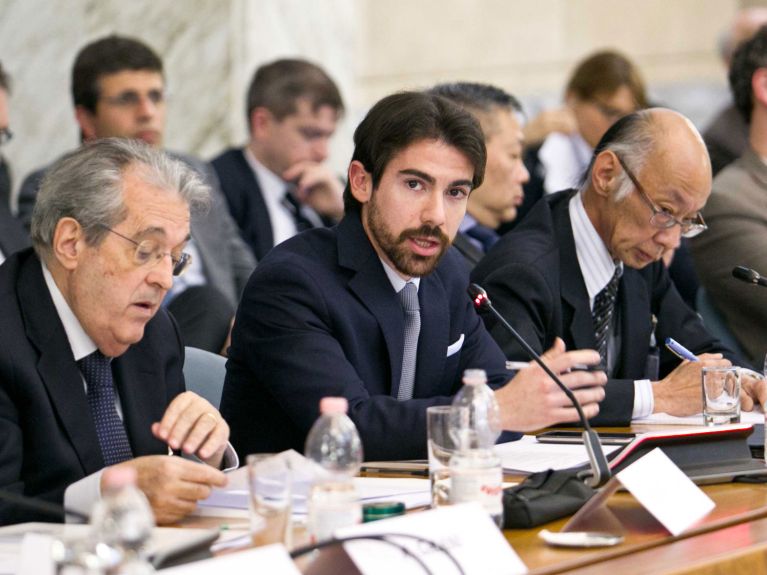“The populists are short-sighted in their approach”
Italian economist Simone Romano criticises how the classical parties have responded to the crisis and warns of the consequences this has for the EU.

Simone Romano conducts research on international politics and the Monetary Union at Rome’s Istituto Affari Internazionali (I.A.I.). In our interview he warns against populism and its consequences and analyses the current financial dispute between the EU and the government in Rome.
Mr Romano, you are a critic of the current state of the EU. Why?
The governments in Germany, Italy and the other major European states simply do not trust one another enough. And they lack common goals for Europe. They are simply opting for business as usual. That won’t go anywhere. Instead, Germany and Italy for example should overcome their differences and learn to understand each other.
If Germany wants to shape the EU it must also assume responsibility for things.
With what objective?
Italy should use the current, favourable economic moment to further improve its economy. And structural reforms are also on the agenda. We need them anyway, and not just because Germany or the EU say we do. On the other hand, Germany must at long last better grasp its role in Europe: The EU requires leadership to move forward. And Germany is a natural candidate for that role. Which requires teamwork: No football captain simply wants to score goals without taking any notice of the team or the outcome of the match. Meaning, if Germany wants to shape mechanisms in the EU it must also assume responsibility for things.
What changes has the new Italian government ushered in?
The current Italian government tends to be described as populist: Fighting in the interests of the “true people” against those of the elites and the establishment. This brought them election successes, but at the same time creates a problem if the party wishes to fulfil the population’s wishes, irrespective of whether these are rational or far-sighted.
The EU has just rejected Italy’s budget proposal because it hinges on dramatic new debt. The new Italian government wanted among other things to pay for the wish among its voters for a basic income for all and an earlier start to retirement …
The financial laws being discussed at present are a good example: I am not a fan of strict austerity, but am also wary of short-term priming of the economic pump: This may make you popular, but at a very high price. Another problem is the narrative currently being used. It will invariably end up with someone saying: “We would like to lower retirement entry ages and taxes in Italy, but Germany, France and the Eurocrats and the establishment won’t let us.” That is extremely simplistic and irresponsible.
The classical parties have failed to listen to people’s needs.
What triggered this rise in populism?
The classical parties to the left and right of the centre have failed to respond adequately to the past economic crisis and have not made enough of an effort to listen to people’s needs. By contrast, the new populist parties do supply answers to their questions and provide them with a sense of security in these uncertain times. The problem is that their answers are often short sighted and, in some cases, misguided.
What has to change at the EU level?
We need to stop seeing Europe as the sum of its parts in which member states only pursue their own interests. Take, for example the negotiations for the multiannual financial framework. All the member states pursue a “just returns” logic: they weigh up what they give to Europe and what they get back from Europe. In doing so they strive to strike a balance that pays no regard to an overriding benefit. Such a practice will inevitably destroy the European Union, which is a wonderful project steeped in history.
Take another example: following the two economic crises in 2008 and 2011 the EU began to develop crisis prevention tools. However, different national interests stood in the way of these instruments being finalized, and the same has happened with the European monetary union. However, in order to function the two projects need to be completed. As soon as the next crisis hits us and instruments like the European Banking Union still do not function we will face major problems.
How do you see the role of the United States in this connection?
The global role of the United States has altered as has its role in relation to Europe. A trade war is in progress between the two largest world economies, namely China and the United States. Moreover, for the first time since the Second World War, the United States government seeks only to protect its own interests. Given this insecure political landscape the only course of action for our European nations, given that they are so tiny compared to China and India, is to close ranks and act as one. And if we do this we can be protagonists rather than simply onlookers.
Interview: Sebastian Grundke
Newsletter #UpdateGermany: You would like to receive regular information about Germany? Subscribe here to:
